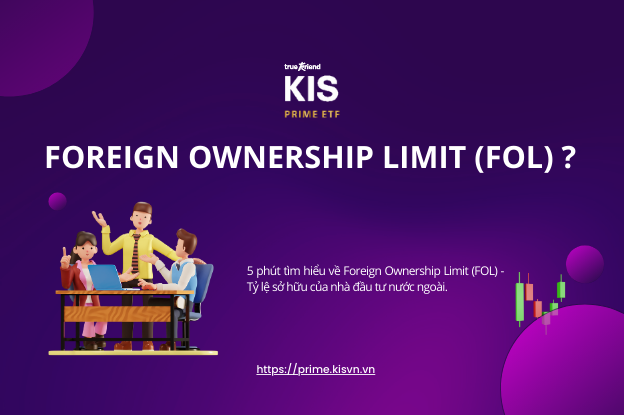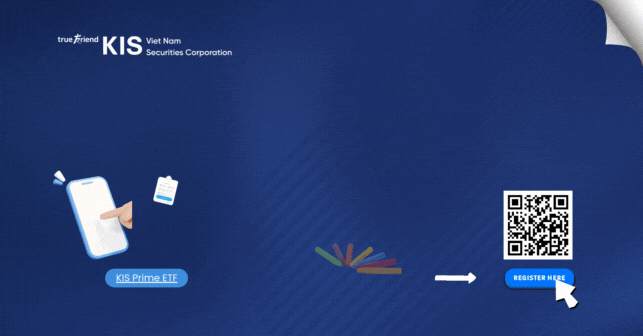ETF Basic
Foreign Ownership Limit (FOL)
Explanation of the term Foreign Ownership Limit (FOL) along with KIS Prime:

|
1. Foreign Ownership Limit (FOL)?
- The term Foreign Ownership Limit (FOL) refers to the maximum percentage of shares that foreign investors are permitted to hold in a Vietnamese company shares.
- Since 1986, the Vietnamese government has implemented the FOL to regulate foreign investments and maintain economic stability. Before 2015, the FOL rate was set for most publicly traded stocks in Vietnam at 49% (or 30% for certain sectors like banking and credit institutions) to restrict foreign investor participation and control crucial sectors of the economy. Since 2015, some companies have been granted the authority to set their own FOL limits.
- In the securities sector, the FOL ratio is applied to monitor and manage the level of foreign ownership in the shares of 763 listed companies on the Ho Chi Minh Stock Exchange (HOSE) and the Hanoi Stock Exchange (HNX). Once a stock reaches the FOL limit, foreign investors are limited from further purchases until the ownership percentage is reduced.
2. Impact on Investors and the Market
- For Foreign Investors: The Foreign Ownership Limit (FOL) restricts buying stocks of companies with low FOL. High FOL companies may be excluded from global indices, impacting international ETFs that hold Vietnamese shares and affecting overall growth performance.
- For the Domestic Market: The limit of FOL to the banking sector and strategic industries aims to protect the rights and stability of the domestic financial system, reducing the risk of dominance and control of the stock market by foreign investors.
- Challenges for Market: The SBV highlights FOL poses a challenge to the Vietnamese stock market’s development plan, aiming for an upgrade by 2025, as laid out in the Prime Minister’s initiative. A noteworthy change involves lowering the FOL limit for foreign investors in Vietnamese companies from 50% to 30%. This adjustment predominantly impacts companies with significant influence in sectors that demand careful government control. However, specific regulations on FOL conditions, outlined in Decree 155/2020/ND-CP, Article 139 are still pending establishment.
- Foreign-invested banks encounter challenges as the government holds a significant ownership stake, limiting share transfers. This impacts liquidity and effectively reduces the Foreign Ownership Limit (FOL) for foreign investors.
3. How can foreign investors invest in the Vietnamese stock market?
- Foreign investors can consider ETFs as a viable investment option to engage in the Vietnamese stock market. The VN Diamond ETF focuses on 18 leading stocks in Vietnam, playing a pivotal role in the nation’s economic and stock market progress. Within the ETF portfolio, priority is given to stocks with a minimum 95% FOL coefficient, providing various benefits for foreign investors:
- 1. Diversification of Portfolio: Investing in only an ETF allows foreign investors to diversify portfolios, enhancing financial value and minimizing risks through the allocation of a range of different stocks.
- 2. By focusing on stocks with high FOL, foreign investors can invest in companies with significant growth potential in the Vietnamese market.
Investing in ETFs like VN Diamond is an effective way for foreign investors to access and participate in the Vietnamese stock market flexibly and efficiently.
4. How to trade the VN Diamond ETF?
- To invest in the VN Diamond ETF, foreign investors can register with securities companies or the authorized participant (AP) ETF in Vietnam, such as KIS Vietnam.
- Please note that the process of purchasing ETFs may vary. For detailed information and prompt assistance, kindly reach out directly to KIS Prime ETF. >>> Registration: KIS Vietnam
- Source
- Follow KIS Vietnam to update the latest Vietnam ETF and investment knowledge.
- Website: https://prime.kisvn.vn/
- Vietnam Exchange Traded Fund: KIS Prime
- Knowledge A-Z: Education
